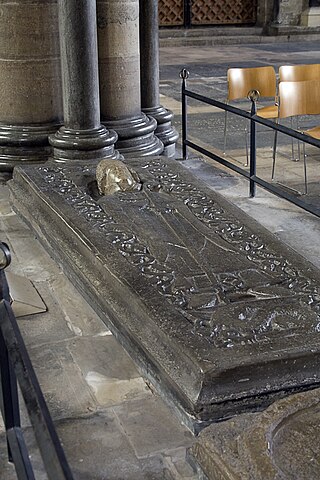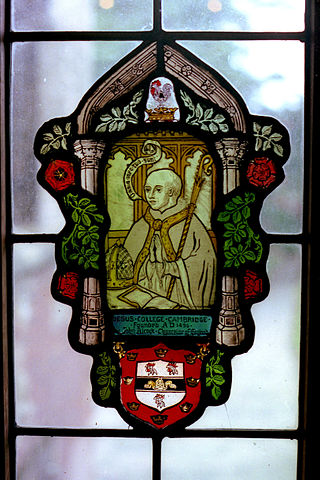Related Research Articles

Thomas Bourchier was a medieval English cardinal, Archbishop of Canterbury, and Lord Chancellor of England.

Simon Sudbury was Bishop of London from 1361 to 1375, Archbishop of Canterbury from 1375 until his death, and in the last year of his life Lord Chancellor of England. He met a violent death during the Peasants' Revolt in 1381.
Walter Reynolds was Bishop of Worcester and then Archbishop of Canterbury (1313–1327) as well as Lord High Treasurer and Lord Chancellor.
Simon Langham was an English clergyman who was Archbishop of Canterbury and a cardinal.

John Kemp was a medieval English cardinal, Archbishop of Canterbury, and Lord Chancellor of England.
William Courtenay was Archbishop of Canterbury (1381–1396), having previously been Bishop of Hereford and Bishop of London.

Roger of Salisbury, was a Norman medieval bishop of Salisbury and the seventh Lord Chancellor and Lord Keeper of England.

Thomas Arundel was an English clergyman who served as Lord Chancellor and Archbishop of York during the reign of Richard II, as well as Archbishop of Canterbury in 1397 and from 1399 until his death, an outspoken opponent of the Lollards. He was instrumental in the usurpation of Richard by his cousin Henry Bolingbroke, who became Henry IV.

John Alcock was an English churchman, bishop and Lord Chancellor.
Simon Islip was an English prelate. He served as Archbishop of Canterbury between 1349 and 1366.
Walter Giffard was Lord Chancellor of England and Archbishop of York.
Richard Courtenay was an English prelate and university chancellor, who served as Bishop of Norwich from 1413 to 1415.
Eadsige, was Archbishop of Canterbury from 1038 to 1050. He crowned Edward the Confessor as king of England in 1043.
Thomas Brunce was a 15th-century Bishop of Rochester and then Bishop of Norwich.
Thomas Cobham was an English churchman, who was Archbishop-elect of Canterbury in 1313 and later Bishop of Worcester from 1317 to 1327.
John Russell was an English Bishop of Rochester and bishop of Lincoln and Lord Chancellor.
John Bottlesham was a medieval Bishop of Rochester.
Simon was a medieval Bishop of Worcester.
William of Northall was a mediaeval Bishop of Worcester.
References
- This article incorporates text from a publication now in the public domain : Chisholm, Hugh, ed. (1911). "Whittlesea, William". Encyclopædia Britannica . Vol. 28 (11th ed.). Cambridge University Press. p. 615.
- Fryde, E. B.; Greenway, D. E.; Porter, S.; Roy, I. (1996). Handbook of British Chronology (Third revised ed.). Cambridge: Cambridge University Press. ISBN 0-521-56350-X.
- Roach, J. P. C., ed. (1959). "The colleges and halls: Peterhouse". A History of the County of Cambridge and the Isle of Ely: Volume 3: The City and University of Cambridge. pp. 334–340.
- Tait, James (1900). . In Lee, Sidney (ed.). Dictionary of National Biography . Vol. 61. London: Smith, Elder & Co.
- Swanson, R. N. "Wittleseye , William (d. 1374)". Oxford Dictionary of National Biography (online ed.). Oxford University Press. doi:10.1093/ref:odnb/29333.(Subscription or UK public library membership required.)